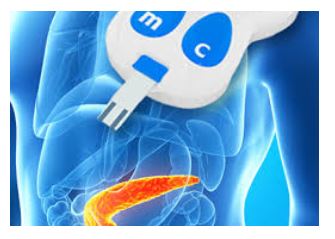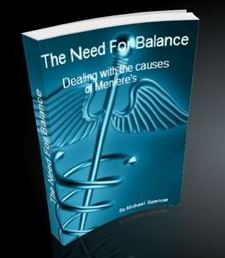Diabetes and Meniere’s Disease
Posted Under: General Information on Meniere's Disease / Syndrome,Meniere's Disease and Nutrition,Meniere's Disease Triggers & Causes
Table of Contents
Diabetes and Meniere’s Disease – what are the links?

What are the links between diabetes and Meniere’s disease?
Are the two connected at all, is it all coincidence or are the two a result of the same root cause in some people?
A sizable number of Meniere’s sufferers who contact Meniere’s Help also suffer from Diabetes. Glucose metabolism, and insulin irregularities have both been linked to Meniere’s in some way or another.
The biggest problem with trying to link diabetes and Meniere’s is that the huge number of people suffering from diabetes means that by law of averages there will naturally be a sizable number of people suffering from both conditions.
According to the WHO: 422 million adults worldwide have diabetes. That is 1 person in 11. While type 1 is thought of as genetic, 90% of sufferers are actually type 2. These statistics are predicted to double over the next 2 years. Since 1980 the number of adults living with diabetes has almost quadrupled.
In the USA 2012 figures show us that at least 29.1 million Americans, or 9.3% of the population, had diabetes. 1.4 million Americans are diagnosed with diabetes every year. In 2012, 86 million Americans age 20 and older had prediabetes; this was up from 79 million in 2010. These statistics are staggering; clearly this is not going away soon.
Although the main focus on the tackling of this rise of diabetes is aimed at the obesity epidemic, and rightly so, it has to be taken into account that diabetes is on the rise in places like Asia where obesity isn’t so prevalent. The rise of forced farming practices in recent years practically runs parallel with the increase of diabetes and many other avoidable diseases.
In the 2016 WHO ‘Global Report on Diabetes’ the director general of the WHO points out that diabetes is, “No longer a disease of predominantly rich nations, the prevalence of diabetes is steadily increasing everywhere, most markedly in the world’s middle-income countries.”
The globalization of fast food chains, growing global demand for wheat grown on soils depleted of its mineral content through the overuse of NPK artificial fertilizers and the demand for overly polished rice must all play its part.
White bread can turn to glucose inside the body faster than sugar! White, polished rice can turn to glucose very quickly also if not balanced with fats or proteins. Add to this the empty carbohydrates being proudly stuffed down kids throats throughout Asia where it is a sign of wealth to go to the most unhealthy fast food chains simply because they symbolize the monetary richness of the west.
Sugary sodas, alcohol, candies and the prevalence of processed foods are all contributing greatly to this problem. This bombardment of sugars strains the pancreas so much that it cannot keep up with the demand for insulin to regulate blood sugar levels.
There are several aspects that link all of this to Meniere’s without looking at the diabetes connection itself. Firstly the pancreas is part of the endocrine system. Endocrine dysfunctions have been linked to Meniere’s. The thyroid is part of the endocrine system and has been linked to Meniere’s. T-cell regulation has been linked to Meniere’s. T-cells are regulated by the thymus which in turn is regulated by the thyroid. Metabolism has been linked to Meniere’s. High triglyceride and cholesterol levels have been linked to Meniere’s.
Are you seeing a pattern here?
Diabetes and Meniere’s Disease – studies
A multitude of studies can be found on each of the individual links stated above but not enough focus on the obvious solution to most of this. Diet. It really is that simple.
What you eat and do not eat makes all the difference in every case, and of course the same is true of diabetes.
Both hyperglycemia (high blood sugar) and hypoglycemia (low blood sugar) have been linked to and investigated in Meniere’s and vestibular diseases. This suggests that any alterations in insulin can cause issues. Insulin regulates both sodium and potassium retention, something very relevant in the functioning of the inner ear.
A 2009 study in the Brazilian Journal of Otorhinolaryngology, ‘Blood glucose and insulin levels in patients with peripheral vestibular disease‘ found that:
“The four-hour glucose-insulin index showed 87.7% of patients with dizziness and suspicion of peripheral vestibular dysfunction having glucose and insulin metabolism alterations.”
The International Tinnitus Journal published a study in 2005, ‘Glucose and insulin profiles and their correlations in Ménière’s disease.’ It stated that:
“Changes in carbohydrate metabolism, admittedly one of the most prevalent etiologies of Ménière’s syndrome, can be diagnosed early by 5-hour glucose and insulin curves with a 100-g glucose load, a test more sensitive than those traditionally used in investigating impaired glucose tolerance or diabetes mellitus. This study investigated carbohydrate metabolism characteristics in 64 patients with typical Ménière’s disease. We demonstrated that 72% of them had some variable degree of hyperinsulinemia as shown by their plasma insulin curves, whereas alterations on the glucose curve (reactive hypoglycemia or hyperglycemia) were found for only 21%.”
It concluded that:
“These findings confirm the need to include 5-hour glucose and insulin curves in the diagnostic routine when investigating Ménière’s disease. In that way, an early diagnosis of hyperinsulinemia, the metabolic change most often involved in the pathogenesis of cochleovestibular disorders, can be made.”
An earlier study published in Acta Otolaryngologica in 1984, ‘Blood levels of glucose and insulin in Meniere’s disease‘ stated the following:
“It has been reported that a very commonly overlooked cause of vertigo is disorder of glucose metabolism. This may not be reflected in the glucose tolerance test alone, but becomes obvious when the insulin levels in blood are evaluated simultaneously.
Thirty-one patients with Meniere’s disease underwent a 5-hour glucose tolerance test with radioimmune assay of insulin. It was found that 67.7% of our patients showed some abnormality in the relationship between the blood levels of glucose and insulin.”
The studies above, in addition to several others connecting insulin and glucose to Meniere’s are all cited on PubMed.
More specific to diabetes is the 2013 study published on Science Direct from the Journal of Otology, ‘Effects of Diabetes on Hearing and Cochlear Structures’.
“Diabetes mellitus (DM) is a chronic systemic disease characterized by hyperglycemia, with various pathogenic mechanisms. From absolute or relative insulin deficiency, patients with DM often demonstrate various levels of metabolic disorders. Major clinical manifestations of DM include metabolic disorders, vascular lesions, circulatory disturbances and neurologic complications. Along with advances in DM research, reports of DM related tinnitus and hearing impairment have increased continuously.
DM is closely linked to hearing damage. Both large and microscopic size blood vessels are affected in DM. Metabolic disorders, atherosclerotic changes and micro vessel diseases result in ischemia and hypoxia in neural tissues, leading to nerve damage. When such pathological changes involve the cochlea and auditory nerve, cochlear and/or neural hearing loss follows.”
Although this study does not mention ‘Meniere’s disease’ it shows us how blood flow, insulin and metabolic disorders can affect ear function.
It is a fact that Meniere’s help has received many emails from people who suffer from both Meniere’s disease and diabetes. In some cases diabetes preceded the symptoms of Meniere’s, while with others it was the other way round. So proving a link between Meniere’s and diabetes itself is hard to do. However, several of the factors that lead to diabetes can also be linked to Meniere’s.
At the end of the day, it all comes down to what you eat and do not eat. If the onset of Meniere’s is related to metabolism, endocrine disorders or thyroid dysfunction for example then the same reasons these problems occur could be the same reasons at root cause that Meniere’s symptoms manifest. Poor diet and lifestyle causes dysfunctions throughout the body that can lead to various conditions including both Meniere’s and diabetes.
We have received updates from Meniere’s sufferers in the past where, when they changed their diet, lifestyle and in many cases used a specific supplement regimen they not only reduced or eliminated their Meniere’s symptoms but also improved their condition related to diabetes.
This underscores the importance of the right nutrition. No remedy or drug can compensate for a poor diet. However a good healthy whole food (organic where possible) diet supported by quality supplementation can reduce the symptoms of, reverse or eliminate many conditions, Meniere’s and diabetes among them.
At precisely the same time I was writing this article The Express news paper online published a report, ‘Removing bread and pasta from diets ‘can reverse Type 2 diabetes’
Diabetes.co.uk, the world’s largest community of sufferers revealed that 7,000 Type 2 patients using a low refined carbohydrate dietary program saved £6.9 million on medication in a year. They claimed that,
“Slashing consumption of rice, potatoes and sugar has the potential to halt one of Britain’s biggest health epidemics. Switching to a healthier lifestyle could save the cash-strapped NHS £10 billion a year – the amount spent treating the condition – and change people’s lives in just 12 months.”
Co-author of the book this study is published in, Dr Aseem Malhotra said,
“The good news is it’s entirely preventable – but also reversible – and simple dietary changes through cutting refined carbohydrates can at the very least help patients come off medications. Simple diet changes have rapid and substantial benefits not just for patients with Type 2 but for high blood pressure and heart disease too.”
Charlotte Summers, of Diabetes.co.uk said,
“We are seeing phenomenal results from people taking a lifestyle first approach on the low carb program which is saving NHS budgets and lives.”
Type in “diabetes diet” or something similar into your search engine and you will find a plethora of diet plans online for diabetics.
Can type 2 diabetes be reversed?
In a simple 12-minute presentation to the U.K. Parliament, Zoe Harcombe, Ph.D., who spent years researching dietary guidelines as they relate to nutrition and obesity, succinctly demonstrates how bad science supports rising rates of diabetes and other nutritionally triggered diseases.
For Meniere’s the right diet and supplementation can help the immune system deal with the inflammation causing the symptoms. Dealing with the cause of the inflammation on the other hand often needs more than simply the correct diet. This depends on the root of the problem and there are several for you to consider.
Finding the root cause or causes of Meniere’s in your own individual case can be done though. If you find your root cause, you have found the key to your cure or solution, whichever words you choose to use. Eliminate or correct the root cause and you can overcome Meniere’s completely. This is something we have constantly seen among sufferers over the past 13 years of support work.
Finally, it is important that if you are both a diabetic and have Meniere’s you should be careful using steroids as a treatment for your Meniere’s. Increases in blood glucose are common among people taking prednisone and other steroids. These steroids are referred to as ‘glucocorticoids’. Perhaps of even more significance is the fact that long term use of these steroids can produce “Steroid induced diabetes” and a host of other very serious conditions.
According to a study ‘Steroid-induced diabetes‘ cited on PubMed.gov in 2014, “Glucocorticoids have various common metabolic side effects including hypertension, osteoporosis and diabetes. As the therapeutic benefits of glucocorticoids continue to expand across medical specialties, the incidence of steroid-induced or steroid-exacerbated diabetes will continue to rise.”
There are plenty of ways to reduce inflammation naturally to tackle your Meniere’s symptoms. If you have the choice of steroids or the right foods, which will you choose?
If you found this article useful Click here to support Meniere’s Help paypal.me/menieres
Related articles:
By Mike Spencer
Founder of Meniere’s Help
Researcher and author of Managing Meniere’s Disease and The Need for Balance – Dealing with the Causes of Meniere’s
Help other Meniere’s sufferers. Do have experience with Meniere’s and diabetes? Tell us all about it in the comments boxes below or email Mike at meniereshelp@gmail.com
Reference/Further reading: Possible effect of diabetes and hypertension on the quality of life of patients suffering from Ménière’s disease








Reader Comments
I have menieres…just read your blog…sounds like your advice and books would really help me. Thanks 4 your help